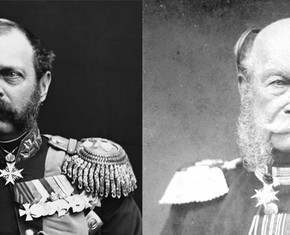The views expressed in our content reflect individual perspectives and do not represent the authoritative views of the Baha'i Faith.
When the rulers and clerics of Persia and the Ottoman Empire exiled Baha’u’llah from place to place and from one prison to another, they attempted – and failed – to suppress his teachings.
Baha’u’llah remained in the capital of the Ottoman Empire, Constantinople, now called Istanbul, for a period of four months in 1863 before he was exiled again by the Turkish government to the city of Adrianople.
Adrianople, known today as Edirne, is in the European part of Turkey on the border with Greece and Bulgaria. As a result of this latest exile, Baha’u’llah became the first messenger of God in recorded history to cross from Asia into Europe – from the global East to the global West.
During the next four and a half years, while he lived in Adrianople, Baha’u’llah began to proclaim his message to the kings and rulers of the world, announcing that he was the Promised One of all ages.
One after the other, Baha’u’llah turned his attention to the crowned heads of Europe and Asia, inviting them to resolve their differences and work for the establishment of world peace. These included Napoleon III of France, Kaiser William I of Germany, Tzar Nikolaevich Alexander II of Russia, Sultan Abdu’l-Aziz of the Ottoman Empire, Francis Joseph, Emperor of Austria and King of Hungary, Nasiri’d-Din Shah of Persia, Pope Pius IX of the Roman Catholic Church, and Queen Victoria of the British Empire. Although Baha’u’llah addressed each one, discussing the specific strengths or weaknesses of their individual policies, he also proclaimed the appearance of a new messenger of God and outlined the responsibilities of those in power to safeguard the well-being of all people and to use their resources for the establishment of international peace. He counseled disarmament, the cessation of war and the coming together of all the world’s leaders to created a global parliament:
O ye the elected representatives of the people in every land! Take ye counsel together, and let your concern be only for that which profiteth mankind, and bettereth the condition thereof, if ye be of them that scan heedfully. – Baha’u’llah, The Proclamation of Baha’u’llah, p. 65.
Baha’u’llah praised those rulers who had promoted justice and human rights, and warned those who were heading towards disaster. He promised each one a glorious destiny if they listened to his counsel, and predicted the downfall, often in detail, of those who were heedless. The fate of each one of these rulers is fascinating.
Baha’u’llah first wrote to the most powerful monarch of the times, Louis-Napoléon Bonaparte known as Napoleon III of France:
O King of Paris! Tell the priest to ring the bells no longer. By God, the True One! The Most Mighty Bell hath appeared … We have desired for thee naught except that which is better for thee than what thou dost possess and all the treasures of the earth… Set your face towards Him (Baha’u’llah) on this Day which God hath exalted above all other days, and whereon the All-Merciful hath shed the splendour of His effulgent glory upon all who are in heaven and all who are on earth. Arise thou to serve God and help His Cause. He verily, will assist thee with the hosts of the seen and the unseen, and will set thee king over all that whereon the sun riseth … – Ibid., p. 17.
Napoleon III is reported to have read the translation of Baha’u’llah’s letter and thrown it over his shoulder, arrogantly declaring that “If this is of God, I am two Gods.” Napoleon III was to receive two letters. Soon after the first, Baha’u’llah wrote again reminding him of the value of courtesy and compassion for the victims of oppression. Baha’u’llah offered him the opportunity of redeeming his past behavior by heeding the advice of the messenger of God, at the same time predicting the ruin of Napoleon III if he did not:
O King! Hadst thou been sincere in thy words, thou wouldst have not cast behind thy back the Book of God … For what thou hast done, thy kingdom shall be thrown into confusion, and thine empire shall pass from thine hands, as a punishment for that which thou hast wrought. Then wilt thou know how thou hast plainly erred … Hath thy pomp made thee proud? By My Life! It shall not endure; nay, it shall soon pass away… We see abasement hastening after thee, whilst thou art of the heedless … – Ibid., p. 20.
Napoleon III, the most illustrious Western monarch of his day, sustained a sudden and ignominious defeat at the Battle of Sedan in 1870, an event which marked one of the greatest military surrenders in modern history. He lost his kingdom and spent the remaining years of his life in disgrace and exile. When the empire collapsed, his monarchy was replaced by the third French Republic. Napoleon III was the last king of France.
Wilhelm Friedrich Ludwig, known as Kaiser William I of Germany, the king who defeated Napoleon III, was crowned Emperor of a united Germany in a ceremony which took place in the Palace of Versailles outside Paris. This monarch was the next to receive a tablet from Baha’u’llah:
Say: O King of Berlin! Give ear unto the Voice calling from this manifest Temple. Take heed lest pride debar thee from recognizing the Dayspring of Divine Revelation, lest earthly desires shut thee out, as by a veil, from the Lord of the Throne above and the earth below. Do thou remember the one whose power transcended thy power (Napoleon III), and whose station excelled thy station? Where is he? Whither are gone the things he possessed? Take warning, and be not of them that are fast asleep. He it was who cast the Tablet of God behind him, when we made known unto him what the host of tyranny had caused Us to suffer. Wherefore, disgrace assailed him from all sides, and he went down to dust in great loss. Think deeply, O King, concerning him, and concerning them who, like unto thee, have conquered cities and ruled over men. The All-Merciful brought them down from their palaces to their graves. Be warned, be of them who reflect. – Ibid., p. 39.
Kaiser William I of Germany, the conqueror of Napoleon III, did not think deeply or reflect. He failed to heed the warning of the very specific consequences which lay ahead if Germany were not to begin the process of disarmament. Baha’u’llah concluded his tablet to William I with these prophecies:
O banks of the Rhine! We have seen you covered with gore, inasmuch as the swords of retribution were drawn against you; and you shall have another turn. And We hear the lamentations. of Berlin, though she be today in conspicuous glory. – Ibid., p. 39.
With these words, Baha’u’llah predicted the two great conflicts of the twentieth century, forty-four years before the First World War, and sixty-nine years before the Second. Kaiser William I himself sustained two attempts on his life, and his throne was bequeathed to his son. William II, through pride and short-sightedness, engulfed Europe in a war which, when Germany lost, precipitated a swift and sudden revolution in the German capital. There were indeed great “lamentations” in Berlin. Communism appeared in several cities, the Kaiser and the princes of the German states abdicated, and the constitution of the Weimar Republic marked the extinction of the empire. In its turn the weakness of the republic and the social instability of the times soon facilitated the rise to power of Adolf Hitler and Nazism.
To the east, Alexander Nikolaevich Romanov, known as Tzar Nikolaevich Alexander II of Russia, also received a letter from Baha’u’llah:
O Tzar of Russia! Incline thine ear unto the voice of God, the King, the Holy, and turn thou unto the Paradise … Arise thou amongst men in the name of this all-compelling Cause, and summon, then, the nations unto God … Blessed be the king whose sovereignty hath withheld him not from his Sovereign, and who hath turned unto God with his heart. – Ibid., p. 27.
Nicolaevich Alexander II also failed to heed the call of Baha’u’llah and, after suffering several attempts on his life, finally died at the hand of an assassin. The harsh policy of repression which he initiated against his own people in the latter part of his reign, and which his successors maintained, led eventually to the Bolshevik Revolution. The people whom he and his heirs had oppressed finally rose up and swept away the empire of the Tzars forever. They executed the Tzar with his consort and family, and in so doing extinguished the dynasty of the Romanovs. A time of war, disease and famine led to the establishment of a militant proletariat government which, until the collapse of Communism, oppressed the population in much the same way as the Tzars had done.
This series of essays is adapted from Joseph Roy Sheppherd’s book The Elements of the Baha’i Faith, with permission from his widow Jan Sheppherd.
















Comments
Sign in or create an account
Continue with Googleor